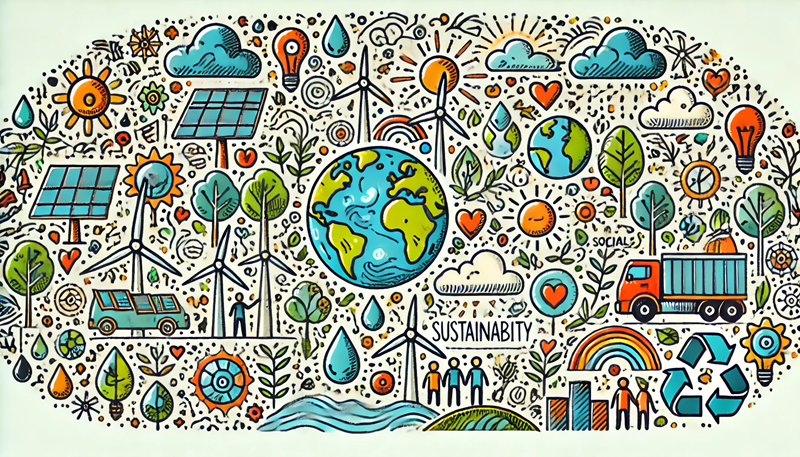Sustainability has become one of the most pivotal concepts of the 21st century, influencing everything from policy-making to personal lifestyle choices. While often associated with environmental conservation, sustainability encompasses much more, intertwining social, economic, and ecological dimensions. In this blog, we’ll explore what sustainability truly means in today’s world, its implications, and why it’s more relevant than ever.
What Does Sustainability Mean in Modern Times?
At its core, sustainability refers to the practice of meeting the needs of the present without compromising the ability of future generations to meet their own needs. This definition, popularized by the Brundtland Report in 1987, remains relevant today. However, its scope has expanded to address the interconnected challenges of economic inequality, environmental degradation, and social injustice.
Sustainability is built on three foundational pillars:
- Environmental Sustainability: Protecting ecosystems, reducing waste, and mitigating climate change.
- Economic Sustainability: Creating systems that support long-term growth without depleting natural resources.
- Social Sustainability: Promoting equity, community well-being, and inclusive development.
1. Environmental Sustainability: Preserving Our Planet
The environmental aspect of sustainability is perhaps the most widely recognized. It focuses on minimizing the negative impacts of human activity on natural ecosystems while ensuring the sustainable use of resources.
Why It Matters
The planet’s resources are finite, and current consumption patterns are depleting them at an unsustainable rate. From deforestation and biodiversity loss to rising greenhouse gas emissions, environmental sustainability is about reversing these trends.
Key Practices
- Transitioning to renewable energy sources like wind and solar.
- Reducing single-use plastics and promoting recycling.
- Supporting conservation efforts to protect wildlife and forests.
Global Efforts
Initiatives like the Paris Agreement emphasize international cooperation to combat climate change, underscoring the need for collective action to ensure a sustainable future.
2. Economic Sustainability: Growth Without Depletion
Economic sustainability focuses on creating resilient economies that balance growth with resource preservation. This approach supports innovation and development while safeguarding the environment for future generations.
Examples in Action
- Circular economy models, where materials are reused and recycled, reduce waste and dependence on raw materials.
- Green technologies, such as energy-efficient appliances and electric vehicles, represent significant advancements.
- Fair trade practices ensure ethical sourcing and equitable economic opportunities.
Corporate Responsibility
Major corporations are increasingly embedding sustainability into their operations. Companies like Patagonia and Tesla are proving that economic success and environmental responsibility can coexist.
3. Social Sustainability: Building Inclusive Communities
Social sustainability is about creating societies where everyone has access to basic rights, opportunities, and resources. It focuses on equity, community well-being, and fostering a sense of belonging.
Key Areas
- Improving access to education and healthcare.
- Addressing gender and income inequality.
- Supporting local communities through grassroots initiatives.
Impact
Socially sustainable practices empower marginalized groups and promote global harmony. For instance, programs that provide clean water and sanitation in developing regions directly align with social sustainability goals.
The Relevance of Sustainability in Today’s World
Sustainability has evolved from a niche concern to a global imperative. Its relevance is amplified by urgent challenges, including climate change, population growth, and resource scarcity. These issues demand a shift in how societies operate, from the individual level to large-scale industrial processes.
Modern Impacts
- Urban Development: Smart cities and green architecture are redefining urban spaces, prioritizing efficiency and minimal environmental impact.
- Food Systems: Sustainable farming practices and plant-based diets are reducing the environmental footprint of food production.
- Consumer Behavior: Growing awareness is driving demand for eco-friendly products, pressuring companies to adopt sustainable practices.
Challenges to Achieving Sustainability
While the concept of sustainability is straightforward, implementing it is not without challenges. Common hurdles include:
- High Costs: Transitioning to sustainable technologies often requires significant upfront investment.
- Resistance to Change: Established industries may resist adopting new practices.
- Inequality: Access to resources and technologies is uneven, with developing regions often lagging.
Solutions
Governments, businesses, and individuals must work collaboratively to overcome these barriers. Incentives for green initiatives, educational campaigns, and international partnerships are crucial steps toward progress.
The Future of Sustainability
The future of sustainability is intrinsically linked to innovation and collective action. Technological advancements, such as artificial intelligence and renewable energy solutions, are creating unprecedented opportunities for sustainable practices. Meanwhile, the rise of conscious consumerism is reshaping markets and encouraging companies to prioritize sustainability.
What Lies Ahead
- The continued integration of sustainability into global policies, such as the United Nations Sustainable Development Goals (SDGs).
- The adoption of more comprehensive metrics to measure sustainability progress, beyond traditional economic indicators.
- A shift toward regenerative systems that restore rather than simply conserve resources.
Conclusion
Sustainability is more than a goal; it’s a way of life that requires a fundamental rethinking of how we interact with the world. Its meaning has grown to encompass not just environmental conservation but also social equity and economic stability. By embracing sustainable practices, individuals, communities, and organizations can ensure a brighter, more resilient future for all.
Understanding and acting on the true meaning of sustainability is critical. It is no longer an option but a necessity to safeguard our planet and ensure the well-being of future generations. Together, we have the power to create a sustainable world. The time to act is now.
